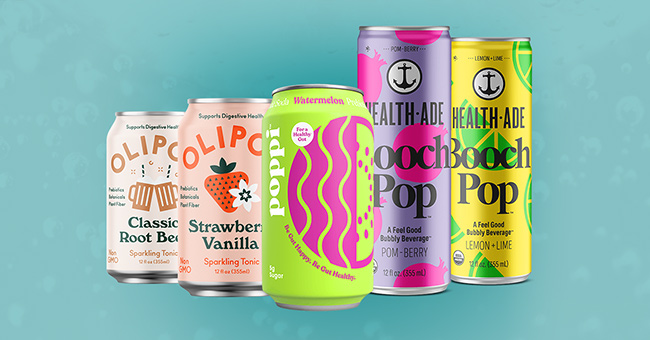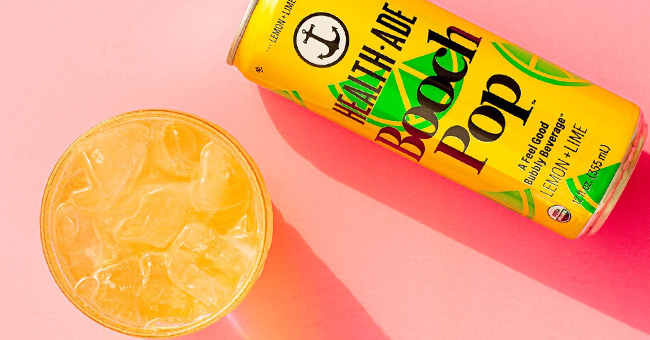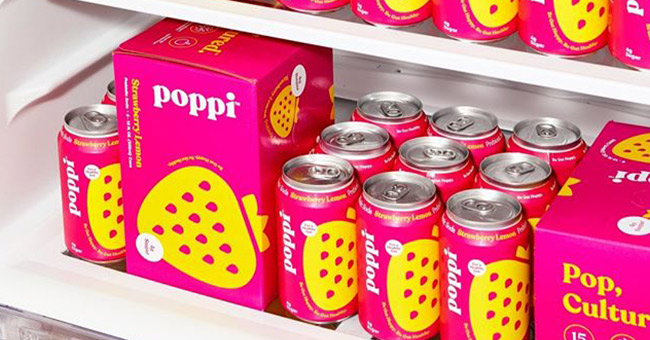A new generation of sodas is popping up.
The decline of traditional CSDs over the past decade has often been attributed to rising consumer concerns over sugars and overall nutritional content. Kombucha and sparkling water brands have attempted to fill the void, but now a slate of low calorie, functional products bearing the hallmarks of classic sodas — from 12 oz. aluminum can packaging to familiar, full-flavored flavor profiles like Root Beer and Cola — has begun hitting the shelves nationwide. Generally focused on promoting gut health through the addition of pre- and probiotics, these products are still young and not wholly proven, but strong sales momentum and institutional interest suggest they may have the potential to become a viable new subcategory.
Whether they’re kombucha, drinking vinegar, switchel or another format, non-alcoholic fermented beverages have existed in the ready-to-drink space for decades, but the overt link to soft drinks is a relatively new development. Texas-based LIVE Soda, which also makes kombuchas and drinking vinegars, began exploring the category in 2018 with a line of probiotic sodas available in nostalgic flavors such as Lemon Lime, Ginger and “Doctor.” That same year, entrepreneurs David Lester and Ben Goodwin co-founded Olipop, a California-based brand of sparkling tonics sweetened with stevia and less than 5 grams of sugar per can, also containing prebiotics, botanicals and plant fiber.
This past year, however, the emerging “Functional Pop” trend accelerated. In January, apple cider vinegar drink maker Mother Beverage announced it was changing its name to Poppi and moving from glass bottles to aluminum cans in order to reposition the brand as a line of vinegar-based prebiotic sodas. That same month, Olipop closed a $10 million Series A funding round as the company prepared for a nationwide retail expansion.
This approach has also caught the attention of institutional investors. Olipop has received investment from Monogram Capital Partners, Döhler Ventures and Terpsi Capital among others and so far this year has expanded its footprint to 3,000 retail doors on both coasts and is now moving into the Midwest. The brand has also added key members to its team, including former RISE Brewing Co. director of sales Abby Redick as its director of national accounts.
Similarly, Poppi has received investment from CAVU Venture Partners, as well as an individual 25% stake taken by CAVU co-founder Rohan Oza, who invested as part of the brand’s 2018 appearance on Shark Tank. Oza’s involvement also helped guide the brand to its current version and this partnership has already opened numerous doors for the Texas-based start up, recruiting talent such as former Vita Coco SVP of marketing Jeff Rubenstein as president and former Popchips and Chef’s Cut director of sales Mark Nino as VP of sales.
“I think that what this new category has become is it’s kind of picking up where kombucha left off,” said Poppi co-founder Allison Ellsworth. “What I think that we’ve done over here at Poppi is we’ve created a product where you’re getting that function like you would with a kombucha but it tastes better and it’s more palatable for the masses.”
Over the summer, the ripple in the market turned into a wave, with several established companies and industry veterans entering the space. Health-Ade Kombucha threw its hat into the ring with the launch of Health-Ade Booch Pop, a kombucha-adjacent prebiotic soft drink. Nantucket Nectars co-founder Tom First made a return to entrepreneurship with Culture Pop, a probiotic soda line. Heading into the fall, the interest in sparkling drinks with gut health properties hasn’t slowed as Molson Coors Beverage Company announced in September its own probiotic seltzer line Huzzah!, which is currently rolling out in the California market.
A Kombucha Alternative
The sudden burst of activity for these digestion-aid “pops” — as the bulk of these brands have readily adopted the regional term — comes at a time where kombucha is seeing a slowdown in velocities across all channels. According to a September report by market research firm SPINS, kombucha and fermented beverages surpassed $700 million in sales in multi-outlet (MULO), natural and enhanced stores for the 52-week period ending July 12, up 2.6%. However, while MULO was up 5.9% to $543.3 million, sales in the natural channel dropped 6.5% to $151.6 million. According to the report, growth in the category is being primarily driven by format and functional innovation, while the declines in the natural channel have come as category leaders lose share in the refrigerated beverage against an influx of experimental new products.
Despite falling for nearly a decade straight, sales of CSDs have also begun to rebound, particularly as strategics such as The Coca-Cola Company and PepsiCo have refocused their portfolios and driven growth through zero sugar lines and flavor extensions. According to market research firm Nielsen, retail dollar sales of full sugar carbonated beverages grew 6.9% to $21.3 billion in the 52-week period end August 22, while low calorie products increased 9.3% to $7.8 billion in the same period.
According to Olipop co-founder David Lester, the nascent prebiotic soda segment, though small, is trending in the right direction, having grown 665% year-over-year per the brand’s internal data, with Olipop itself up 500% across all channels. While exact sales data was not available, he suggested that a key driver for the growth is that his company and others may have tapped into a better-for-you soda format with the potential to seize significant market share not just from kombucha but also from traditional CSDs.
Consumer research, Lester said, found that soda drinkers who switch to Olipop on average dropped their soda consumption by as much as 20% per week. In addition to friendly, nostalgic branding, the company has also embraced traditional soda flavors with SKUs such as Root Beer, Vintage Cola, Cherry Vanilla and Orange Squeeze — all of which launched in the past 12 months — as a further means of drawing comparisons (all while calling out low sugar and health benefits on the front label).
“If you look at other brands, like Halo Top, they weren’t the first brand to try light ice cream, they just understood that you have to lean into indulgence,” Lester said. “Beyond Meat, Impossible — veggie burgers existed before them, but they really understood what the consumer was looking for in terms of the meaty texture of a burger,and had the audacity to lean into it. And that’s what we’ve done.”
Though Olipop is only now seeing direct competitors enter the market, CEO Ben Goodwin said the development was “inevitable” and that as this space expands, differentiation will become important. For Olipop, that means focusing on traditional soft drink taste profiles and the addition of plant fiber, while other products such a Poppi and Health-Ade Booch Pop focus on their respective vinegar and kombucha bases for the drinks.
Packaged in 12 oz. slim cans and featuring a lighter taste profile, Health-Ade co-founder and CEO Daina Trout noted that Health-Ade Booch Pop meets the soda occasion of refreshment and celebration. Unlike Olipop, however, Trout does not see the new line as targeting the market share of CSDs, but rather as a product fighting for the attention of the “health conscious shopper” who are buying products such as sparkling water, juice and kombucha.
Though the line has only been in the market for a few months, Trout said early sales have been promising. In Albertsons stores in Southern California, she noted, roughly 50% of all Health-Ade Booch Pop sales have come by expanding baskets and are not taking away sales from other products. This is an unusual development, she said, as typically only 10-20% of new product sales come from expansion. Additionally, 60% of Health-Ade Booch Pop’s volume has been incremental to the kombucha category.
“To me, this means we’re filling a hole that wasn’t being filled before,” Trout said. “I kind of believe that when soda left it left a hole its place. I drink a Spindrift every day, but to me that’s just better than water. I’m not saying there’s anything wrong with that, I love it, but it’s not replacing what soda was. And so perhaps this is an indication that these functional sodas actually are doing that.”
Health-Ade Booch Pop also has the benefit of being shelf stable, a trait Health Ade’s core line has struggled with as it expands its ecommerce presence.
According to Trout, after a retail test in California, Health-Ade Booch Pop will expand nationwide retail next year, though the product is currently available direct-to-consumer and through Amazon. Health-Ade will also seek to extend the line, launching two new flavors on Amazon this month, including Concord Grape and Apple flavor. Trout noted that going forward, Health Ade will utilize ecommerce as a test market for new products and will determine whether to expand the new flavors to retail based on online performance.
Bourcard Nesin, beverage and cannabis researcher at Rabobank, said that although the category is too young to get a strong grasp on its impact on the market, he believed these brands could perform well based on affordable price points and strong branding, but questioned whether prebiotics as a leading functional ingredient could grab consumer attention and drive sales in the same way probiotic products have.
“I think probiotics are extremely valuable now and you’re seeing it come out in a lot of different ways and I think it’s also linked closely to demand for natural ingredients,” Nesin said. “But for me, prebiotics, I don’t know. I don’t think it has the same boom as probiotics and I think has a lot more to do with branding, execution and social media presence than any of these functional attributes. Probiotics I get. They’re naturally occurring microbes. Prebiotics, though, sounds like a shadow of what people actually want. They look like probiotics but have no substance.”
However, he noted that as a line extension for brands such a Health-Ade, the move makes sense as a means of diversifying the company’s portfolio and providing an easier intro to the kombucha category for skeptical consumers. But for startups, it may prove harder to build a consistent brand around the concept.
“It might be ahead of the market, I might be completely wrong, but I think just stacking attributes on attributes on attribute and going from soda to seltzer to Spindrift to kombucha to ‘Pop,’ it feels like a bit of an overstretch from current trends,” he said.
Frothy Investments
In April, just as its rebranded products were hitting shelves, Poppi made a second follow-up appearance on Shark Tank to showcase its transformation after founders Allison and Stephen Ellsworth secured a deal on the show in 2018. Since then, Allison Ellsworth said the brand has experienced a 650% increase in revenue between Q1 and Q3, driven largely by sales on Amazon. The brand’s revenue projections for 2021 are forecasted to grow 300% year-over-year. As well, the brand has played up its immunity boosting aspects, an additional functionality that has paid off during the pandemic.
Though Ellsworth said the company didn’t plan for the level of sales the post-Shark Tank bump gave Poppi, the brand’s relationship with Oza and CAVU allowed it to quickly adjust to the increased demand and ensure repeat purchases. Since April, Poppi has doubled the initial sales spike and has continued to maintain consistent online sales.
Ellsworth noted that Poppi’s use of apple cider vinegar as a base has also helped it to bring in consumers, noting little need for education as surveys showed that most shoppers were familiar with the ingredient and its health benefits. However, packaging the drink as a soda appears to have been the key; Ellsworth suggested that as a drinking vinegar named Mother the product had a “medicinal farmer’s market” feeling that lacked mass appeal. As a prebiotic soda, however, consumers now see the product as something that can be consumed any time of day.
“We really felt like the liquid was incredible,” she said “ It had a kind of flavor that tasted like a Fanta. It’s a refreshing beverage that people love to drink with a meal — burger, fries, salad, you know. So we needed to communicate the occasion of it as ‘have it with a meal,’ versus medicinal.”
Though many innovations from kombucha and other fermented drinks have positioned themselves as better-for-you alternatives to soda in years past, Monogram Capital Partners co-founder and partner Jared Stein said he believes these functional pops are resonating with consumers in an immediate way that skips the “acquired taste” hurdle and shelf life issues that kombucha has faced. Monogram is an investor in Olipop, which Stein said he believes is well positioned because the brand is meeting soda consumers in the middle with a healthier product and not asking them to “abandon” their traditional behavior.
“What Olipop and the others are doing by way of innovation is they’re giving customers a format that they understand and are familiar with,” Stein said. “So you’re not asking for a behavioral change, you’re marrying it with much better ingredients and that to us is one of the reasons we got super excited about Olipop. We believe it’s where big brands are made.”
While it has taken the modern kombucha category nearly a decade to approach $1 billion in sales, Stein said he believes this functional soda category could reach that landmark rapidly — potentially within the next five years — and could eventually grow to be as much as two to three times the size of kombucha.
As consumers treat these new functional pop brands as they would ordinary CSDs, Stein suggested that introducing multi-packs and larger pack sizes will be a significant innovation as well, providing the category further avenues to growth among shoppers who drink multiple cans a day both at-home and on-the-go. The crushability of these products and broad use occasions will drive volume growth and lead brands to scale more rapidly than kombucha and other functional innovations.
“It’s very unlikely or very rare for a consumer to go through three or four kombuchas in a day,” he said. “But if you look at soda behavior, that pattern is already established.”
For Olipop, the brand is already taking aim at the mainstream, adding Kroger banners in the Midwest as well as other mainstream grocery chains such as Giant Eagle. The company is now looking to increase its marketing, launching a digital ad campaign for the launch of its Orange Squeeze flavor last month.
“Looking into our future, we’re looking at all these soda occasions and at different ways that we can meet consumer’s needs from a taste perspective, from a concept perspective from the emotional real estate of soda,” Lester said. “That’s really the goal with it.”


